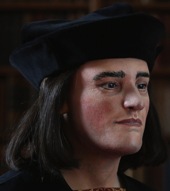Richard’s Achievements
Considering that Richard III only reigned for 777 days, his achievements are considerable. His only parliament sat from 23 January until 22 February 1484. Its legislation was the first to be published in English and the first to be printed. Most of the points below were the fifteen public statutes passed by this parliament.
1. Benevolences were outlawed. Benevolences were a rather sneaky way of putting money in the monarch’s pocket; Edward IV found it useful for his extravagances. Unlike taxes, benevolences were demands by the king without being sanctioned by Parliament. Richard did introduce loans later, but the repayment of these was guaranteed.
2. Laws to protect buyers of land. As during the War of the Roses much land had been confiscated and redistributed and in the transfer of this land important facts were often concealed from the purchaser. To safeguard against these fraudulent practises, all transfers had to be made.
3. Major reforms of the judicial system.
3.1 Bail for suspected felons was created, protecting them from imprisonment before trial. The forfeiture of goods before conviction was also prevented. This also had the effect that JPs would invetsigate cases against suspects much more carefully.
3.2 A minimum property qualification for jurors was introduced as it was believed that better off jurors would be less open to bribery.
3.3 The powers of the so-called “Piepowder” Courts were reduced back to their original limited jurisdiction. These courts had originally been set up to deal with offences committed at fairs, but under Edward IV had started to deal with lots of other matters as well and were often abused by sheriffs and bailiffs.
4. Protection of English merchants against what was regarded as unfair foreign competition.
4.1 The importation of silk lace and ribbons, scissors, bells, nails etc. Was prohibited.
4.2 Italian merchants had to import ten good bow staves with every butt of malmsey.
4.3 Italian merchants has to sell wholesale, not retail and their profits had to be used on buying local goods.
4.4 The cloth trade was regulated to ensure that the cloth met certain standards. However, this statute was cancelled the following October at the request of merchants, who might have felt that it kept them too honest!
5. Exemption of books and printers. The first book was printed in 1477 in England by William Caxton, thus books were a relatively new phenomenon. With all the statutes protecting trade, books were explicitly exempted to support the art of printing and make them widely available for learning. We know from Richard’s surviving books that he was very interested in reading and learning.
6. Creation of the College of Arms. Heralds dealt with arms, which were hereditary and thus with genealogy. In 1484 they were granted a charter of incorporation by Richard III, reflecting his attitude against illegitimacy and the claiming of rights without legal basis. He also gave them a house in Coldharbour to store their records in. However, just one year later Henry VII took it away from them again to give it to his mother, which left the heralds “homeless” until 1555.
7. Court of Requests. There is evidence that in December 1483 Richard III made provisions for the administration of hearing the petitions of poor people, who could normally not afford to seek assistance from the law. This forerunner of the Court of Requests was abolished as soon as Henry VII came to power. He did, however, re-introduce it at some stage, though no registers from before 1493 survive. The Court of Requests became permanently resident at the Palace of Westminster in 1519, during Henry VIII’s reign.
Bibliography:
‘The history of the Royal heralds and the College of Arms’ College of Arms, http://www.college-of-arms.gov.uk/About/01.htm (accessed 14. 11.2009)
‘The Statutes of King Richard III’s Parliament’, The Richard III Foundation, http://www.richard111.com/ (accessed 14.11.2009)
Chris Puplick, “‘He contents the people wherever he goes’ Richard III: His Parliament and Government.” Address to the NSW Branch of the Richard III Society, 10 February 2007, reprinted in The Chronicles of the White Rose, Volume 2, 2008/09, pp. 14-32
Hannes Kleineke, ‘Richard III and the Origins of the Court of Requests’. The Ricardian, Vol.XVII, 2007, pp. 22-32
Anne Sutton, ‘Richard III’s Parliament’, The Richard III Society, http://www.richardiii.net/ (accessed 14.11.2009) (On the Society website go to ‘Richard III’ on the menu on the left hand side, then to ‘The Man’ and then to ‘Richard’s Parliament’)
